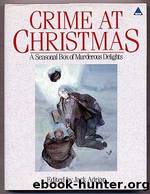Crime at Christmas: A Seasonal Box of Murderous Delights by Jack Adrian

Author:Jack Adrian [Adrian, Jack]
Language: eng
Format: epub
ISBN: 1853360317
Publisher: Equation
Published: 1988-11-30T21:00:00+00:00
Sister Bessie
CYRIL HARE
CYRIL HARE (real name Alfred Alexander Gordon Clark, 1900â58) only wrote nine detective novels. Double that would still have been too few. Out of those nine books, fourâTragedy At Law (1942), With A Bare Bodkin (1946), When The Wind Blows (1949), and An English Murder (1951)âconstitute a quartet of peculiarly English masterpieces of the murder-writerâs art.
Not that the rest of his slim output is that far behind (one book not included is The Magic Bottle, a wholly delightful fantasy for children which begs to be reprinted). I have a particular fondness for Suicide Excepted (1939), a fine novel, much underrated, with a nicely contrived shock at the end. Cyril Hare was good at shocks. Even his last book, He Should Have Died Hereafter (1958), though plotline-slim, manages effortlessly to surprise the reader, even though thereâs a strong nudge in the direction of the solution in its own title. But then he never seemed to mind taking risks. Tragedy At Law has 284 text pages; the only murder takes place on page 253. On the face of it thatâs not just a risk, itâs an act of madness. Yet since it was first published half a century ago the book has achieved classic status. Judge Henry Leon (who, as Henry Ceceil, wrote quantities of legal farces as well as some entertaining and characterful near-mysteries) praised it immoderately; Julian Symons included it amongst his list of âbest, anywhere, everâ.
For most of his working lifeâapart from a brief wartime stint at the Ministry of Economic Warfare, and a longer spell under the Director of Public ProsecutionsâCyril Hare was at the hard end of the law, a working barrister whose career reached its peak when he was appointed a County Court judge. By all accounts he was a congenial man, urbane, dryly amusing, a lawyer to his fingertips yet one who had a gratifyingly short way with lifeâs little problems. His friend Michael Gilbert recalls an occasion when the gasfire in the Detection Club died and no one had a shilling for the meter; it was Cyril Hare who gently pointed out that an Italian one-lira coin worked just as well. All things considered, if Iâd been up before the beak on the Surrey circuit circa 1950-58, I rather think I wouldnât have minded that beak being Judge Gordon Clark.
His short stories are little gems. Iâve yet to come across a real dud. Even his earliest effortsâthose written in his twenties for the popular weeklies and glossy magazines of the day: the Novel Magazine, Pearsonâs Weekly, Passing Show, the Bystanderâexhibit an enviable deftness of touch, narrational and plotting skills well above average, and a natural bent towards jurisprudence, however oddball (âThe Devil and Mr Tosherâ, a very early story and never reprinted, hinges on a slackly drawn-up infernal contract). He had a lively sense of irony which he never lost, and was one of those rare soulsâLeslie Charteris was anotherâcapable of keeping a joke going throughout a full-length novel (thereâs a priceless
Download
This site does not store any files on its server. We only index and link to content provided by other sites. Please contact the content providers to delete copyright contents if any and email us, we'll remove relevant links or contents immediately.
Batman Begins by Dennis O'Neil(1162)
Fatal Fortune by Miranda Rijks(1078)
The Honjin Murders by Seishi Yokomizo(1062)
The Inugami Curse by Seishi Yokomizo(1050)
Coconut Layer Cake Murder by Joanne Fluke(939)
Thrice the Brinded Cat Hath Mew'd by Alan Bradley(878)
Careless Whiskers by Miranda James(867)
Low Pressure by Sandra Brown(860)
Behind Every Lie by Christina McDonald(752)
Murder at Kensington Palace by Andrea Penrose(693)
Midsummer's Nightmare, A(687)
Candy Slain Murder by Maddie Day(687)
Chocolate Cream Pie Murder (A Hannah Swensen Mystery Book 24) by Joanne Fluke(685)
Beating About the Bush by M. C. Beaton(653)
Murder with Honey Ham Biscuits by A.L. Herbert(640)
Fatal Roots by Sheila Connolly(629)
Thin Ice by Paige Shelton(608)
The Honjin Murders (Pushkin Vertigo) by Seishi Yokomizo(596)
Mystery on Hidden Lane: An utterly gripping cozy mystery novel (An Eve Mallow Mystery Book 1) by Clare Chase(579)
